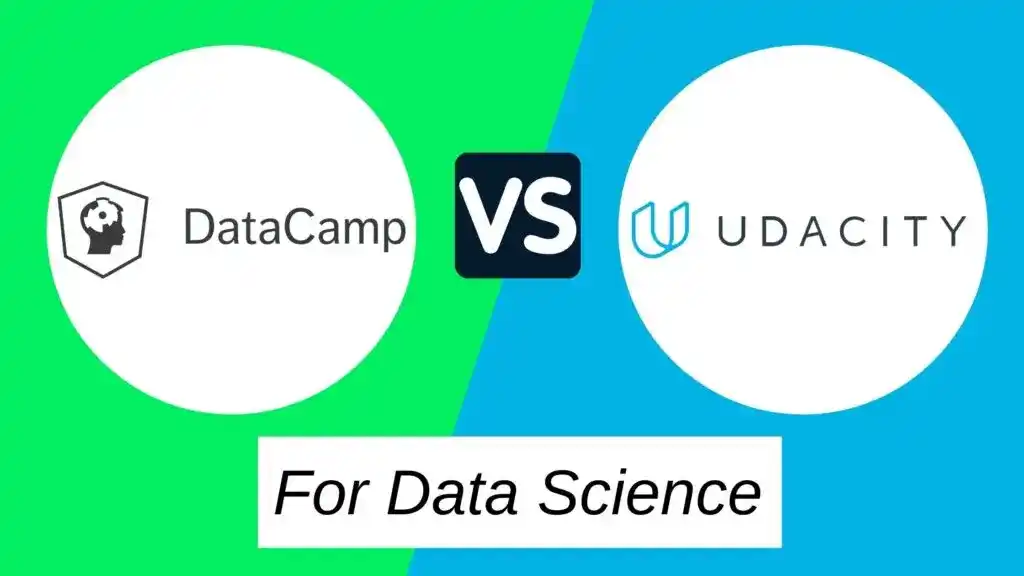Do you want to know which platform is better for learning data science in between Udacity and Datacamp?… If yes, then you are in the right place. In this in-depth comparison, I have compared the Udacity and DataCamp on the 8 parameters. I will discuss these parameters later in this article. So, read this Udacity vs Datacamp for Data Science comparison and clear your doubts.
- What is Udacity?
- What is DataCamp?
- 1. Udacity Vs DataCamp: Cost
- 2. Udacity Vs DataCamp: Instructors
- 3. Udacity Vs DataCamp: Data Science Topics Covered
- 4. Udacity Vs DataCamp: Certificate and Accreditation
- 5. Udacity Vs DataCamp: Quality of the Courses
- 6. Udacity Vs DataCamp: Mentorship
- 7. Udacity Vs DataCamp: Free Courses
- 8. Udacity Vs DataCamp: Course Structure
- What are the Udacity Pros and Cons?
- What are the DataCamp Pros and Cons?
- Who Should Enroll in Udacity?
- Who Should Enroll in DataCamp?
- Summary
- Conclusion
Udacity vs DataCamp for Data Science
Before comparing the Udacity vs Datacamp for Data Science concerning various parameters, let’s understand what is Udacity and DataCamp.
What is Udacity?
Udacity is a for-profit educational platform located in Silicon Valley that provides MOOCs and micro-credential programs (Nanodegrees). MOOC means Massive Open Online Courses.
Udacity was launched in June 2011 by two Stanford university lecturers. They offered their first course free and this course was watched by more than 160,000 students from around 200 counties. And now Udacity has around 12 million users and 300 employees.
Udacity’s courses have partnerships with some reputed organizations for example Facebook, Google, Nvidia, and Amazon.
Udacity provides courses and Nanodegrees in various domains such as Data Science, Programming, Business, Artificial Intelligence, Autonomous Systems, Cloud computing, and Cybersecurity.
What is DataCamp?
DataCamp is an online learning platform specially dedicated to data science. It is based on self-paced learning and has interactive courses, projects, and practice assignments in various programming languages such as Python, R, Sheets, SQL, and Shell.
Datacamp is founded by Belgian data scientists Jonathan Cornelissen, Martijn Theuwissen, and Dieter De Mesmaeker in 2014.
Now let’s compare Udacity and DataCamp with the following 8 parameters and see which will win the Competition-
1. Udacity Vs DataCamp: Cost
Whenever we choose any course, price is always a factor. But we should focus on overall value. So let’s understand the pricing plan of Udacity and DataCamp-
Udacity
Udacity provides two pricing structures-
- Monthly Payment- In this pricing structure, you have to pay the Udacity Fees monthly as you go with the course. This monthly payment cost around $399/month. But most of the time, you get discounts.
- Fixed Monthly Payment- In this payment method, you have to pay for a certain number of months. Let’s say for 4 months or for 5 months. You will get a fixed monthly payment subscription at a discounted rate (15% off) and will pay a one-off fee upfront. But in a fixed monthly payment mode, you need to plan your study in a manner that you can finish the whole Nanodegree program in that period. Otherwise, you have to pay further.
But Udacity also has approx 200 FREE courses, which you can watch at no cost.
DataCamp
Now, let’s understand the plan and pricing of DataCamp. DataCamp has a subscription-based model and provides 3 three plans for individuals-
- Free
- Standard
- Premium
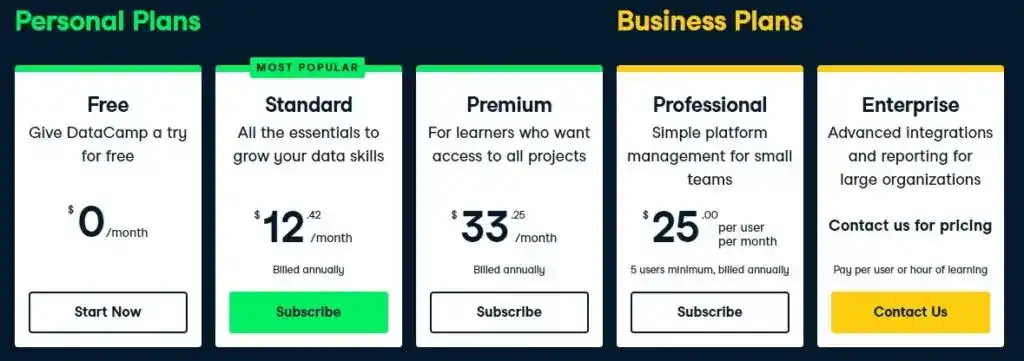
In the free plan, you will get access to the first chapter of all courses, seven projects, three practical challenges, and one skill assessment. The free plan is quite limited and not very useful.
The standard plan offers 335+ courses, 14 career tracks, unlimited skill assessments, and practice challenges, and much more. For the Standard plan, you have to pay $12/month.
In the Premium plan, you have to pay $33/month and you will get everything that is included in Standard Plan plus 80+ projects, Tableau, Power BI, and Oracle content, and priority support.
Winner
In terms of price, the winner depends upon your preference. If you are looking for a less expensive course, then Datacamp is the winner. Because Datacamp has courses at affordable prices.
DataCamp wins. So, the score is Udacity: DataCamp= 0:1
2. Udacity Vs DataCamp: Instructors
If you are planning to enroll in any course, I would recommend you to research who’ll be teaching you. The more details you collect, the better trust you can build with your instructor.
Udacity
Udacity Instructors are industry professionals with more than 5+ years of experience. Udacity prefers experienced professionals from big companies like Amazon, Facebook, YouTube, and Google to provide real-world industry experience. And Udacity requires the following criteria for their instructors-
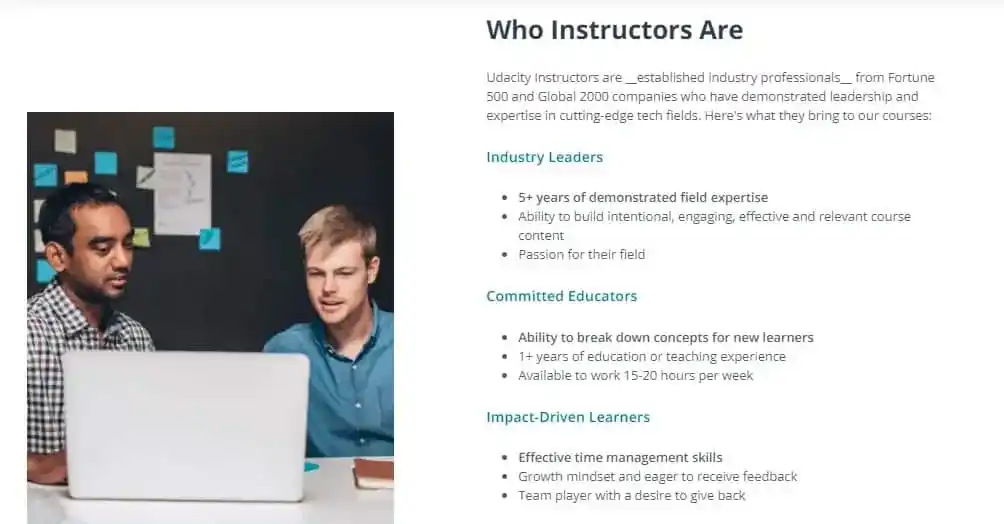
This requirement shows that all the Udacity Instructors are highly professional and experienced.
I personally learned from Olli Iivonen in the Udacity Data Engineering Nanodegree. He is a Data Engineer at Wolt with several years of experience in building and managing data pipelines on various data warehousing environments.
DataCamp
Datacamp has approx 250+ Instructors. Some of them are staff based in Datacamp and some of them are from universities like Newcastle University, University of Washington, etc.
Some instructors are experts, founders, or co-founders of tech companies. So, DataCamp has instructors from various fields so that you can experience different styles of learning.
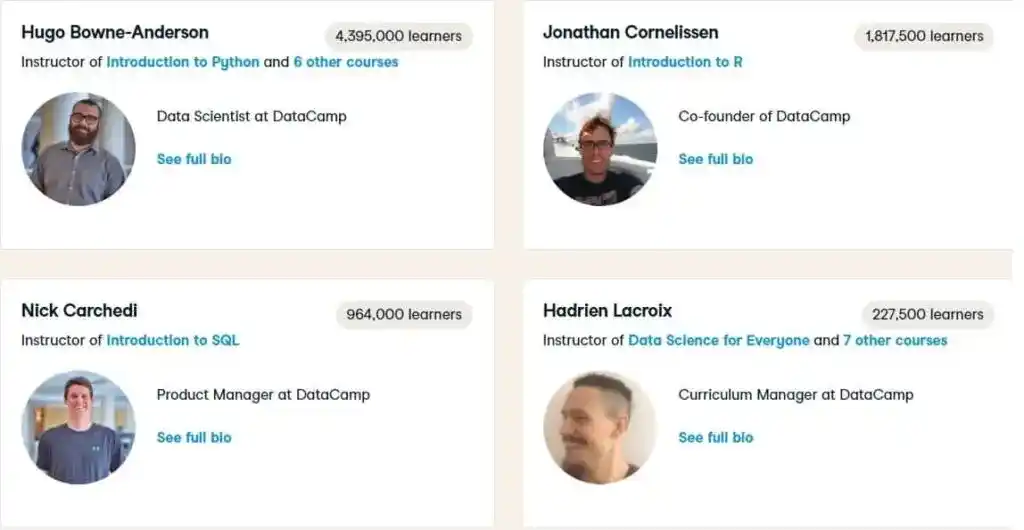
Winner
Both are the winners in terms of Instructors. Because both platforms have experienced and skilled professionals with impressive credentials.
Both are the winners, so the Score is Udacity: DataCamp= 1:2
3. Udacity Vs DataCamp: Data Science Topics Covered
Udacity
In Udacity, the following data science topics are covered-
- Programming Skills
- Statistics
- Machine Learning
- Data wrangling.
- Data Visualization.
- Database Management
- Data Engineering
- Data Analytics
- Business Analytics
DataCamp
Datacamp covers the following topics–
- Data Engineering.
- Programming
- Importing & Cleaning Data
- Data Manipulation
- Data Visualization
- Probability & Statistics
And Datacamp covers the following technologies–
- R
- Python
- SQL
- Git
- Shell
- Spreadsheets
- Theory
- Scala
- Tableau
- Excel
- Power BI
Winner
Both platforms cover almost all data science topics, but Datacamp has more detailed courses on each data science topic and technology. That’s why Datacamp is the winner.
DataCamp wins. So, the score is Udacity: DataCamp= 1:3
4. Udacity Vs DataCamp: Certificate and Accreditation
You might have a question, Are Udacity and DataCamp Certificates Accredited?. So let’s see whether the Udacity and DataCamp Certificates are Accredited or not?
Udacity
Udacity certificates are not accredited by any University. And Udacity is not an accredited educational institution. But Some tech companies give value to Udacity Certificates for hiring new employees. It depends upon the company.
DataCamp
Datacamp provides a free Statement of Accomplishment after completing the course. But this is not an accredited certificate. You can share it on your Linkedin.
Winner
No one is a winner, because both platforms don’t provide Accredited Certificate. But Udacity Certificates are recognized by some tech companies.
No one is the winner. So, the score remains the same. Udacity: DataCamp= 1:3
5. Udacity Vs DataCamp: Quality of the Courses
Quality of the course is the important factor you shouldn’t avoid. So let’s see which platform has good quality of courses.
Udacity
The content quality of the Udacity Nanodegree program is far better than other MOOCs platforms. I am saying this based on my experience and other student’s reviews.
The reason for the high content quality is their practical-based learning. Because when we implement our learning, then it becomes stronger. And all the Nanodegree programs have graded projects and capstone projects for practical exposure.
DataCamp
Most of the Datacamp courses are very good quality, but some of the Datacamp video tutorials are a little short and lacking in detail, so you can think that you are missing something.
But overall the quality of Datacamp courses is also good because DataCamp suggests that an instructor spends 10-30 hours over 6-8 weeks to create a course.
Winner
Udacity is the winner in terms of course quality. Because their content is up to date and has graded projects and capstone projects for practical exposure.
Udacity Wins. So, the score is Udacity:DataCamp= 2:3
6. Udacity Vs DataCamp: Mentorship
One of the biggest problems with online learning is the lack of an involved professor who can help you with any query. So let’s see how Udacity and DataCamp tackle this problem.
Udacity
In Udacity, when you enroll in Udacity Nanodegree program, a one-to-one mentorship is provided by Udacity. This mentor will guide you throughout the program.
You can ask your queries with the mentor. Mentor Support is very helpful when you work on projects. Because during a project, you may have various queries, which you can ask with your mentor. This Udacity’s Mentor support feature is amazing and unique.
DataCamp
Datacamp has its own community. Where you can discuss your doubts with other peers in the community. In the Datacamp community, you can discuss with peers, along with this, there is a curated list of data science news and articles available from experts.
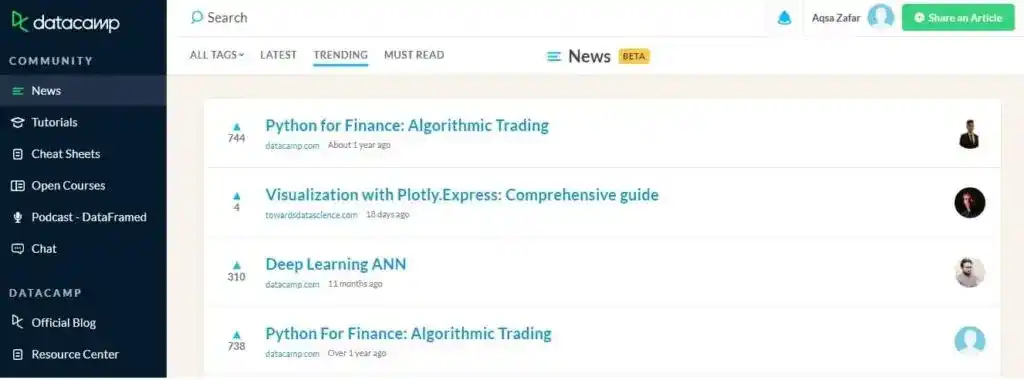
You can check the Datacamp community here. Datacamp community offers 24/7 support to the users.
Winner
Udacity is a winner because, in Udacity, you can ask your doubts with the mentor. But in DataCamp, it’s quite tough to talk with the instructors.
Udacity Wins. So, the score is Udacity:DataCamp= 3:3…It’s a Tie!
7. Udacity Vs DataCamp: Free Courses
Now let’s see the Free courses available on both platforms and their quality.
Udacity
Udacity has around 200 Free courses with good quality content. Which is very rare in other MOOCs platforms. These Udacity free courses are a good place to start and get a basic understanding of the topic.
The content quality of Udacity free courses is good, but they don’t provide other services with free courses like Projects, Certificate of Completion, Mentor Support, and Career Services.
But Udacity free courses are very in-depth and cover much of the same industry-relevant material covered in their Nanodegree programs.
DataCamp
Datacamp provides a Free Plan, where you will get access to the first chapter of all courses, seven projects, three practical challenges, and one skill assessment. The free plan is quite limited and not very useful.
Winner
Udacity is the winner because their free courses also provide more value and cover in-depth concepts of the subject.
Udacity Wins. So, the score is Udacity:DataCamp= 4:3
8. Udacity Vs DataCamp: Course Structure
Course Structure is also an important factor while choosing a course. So, let’s see how is the course structure of Udacity and DataCamp-
Udacity
Udacity provides Free Courses and Nanodegree programs. A Udacity Nanodegree program is an online certification program that can be completed in 4-10 months (10-20 hours/week).
Udacity Nanodegree program helps students to gain skills in different areas related to Data Science, Programming, Business, Artificial Intelligence, Autonomous Systems, Cloud computing, Cybersecurity.
These Nanodegrees are packed with Real-world projects, Case studies, Experiments, and Test cases. Udacity Nanodegree program will help students to advance their skills.
In the Udacity Nanodegree programs, before going to the course content, there is an onboarding process, where you have to perform the following steps-
- Fill a questionnaire
- Review a syllabus
- Setup an individual report plan and exam updates.
This is one of the best approaches to learning. Because when we set some goals, then we are more actively participate in learning. So this approach of the Udacity Nanodegree program will help you to prepare for a focused study.
In each Udacity Nanodegree program, there are some sets of courses. And each course has some set of lessons. These lessons are in a video format with 10-20-minute segments.
Along with video tutorials, there are also some quizzes and graded projects, which you need to submit. I will discuss quizzes and projects in the next section.
Along with quizzes, there are graded projects. These are real-world projects which are reviewed by expert mentors.
These graded projects make the Udacity Nanodegree program unique from others. These graded projects aim to test your excellence and provide practical exposure.
DataCamp
Datacamp provides has 344 interactive courses, 51 skill tracks, 14 career tracks, projects, and practice assignments.
There are 14 career tracks for each role such as Data Scientist with Python, Data Scientist with R, Data Analyst with Python, etc. You can choose three programming languages from R, Python, and SQL.
Each career track has some set of courses. For example in Data Scientist with Python Career track, there are 29 courses and start with basic skills to advanced skills.
So if you are a complete beginner with no idea what to learn first, then career tracks will definitely help you in the correct direction of learning.
I believe that Datacamp’s Career Tracks are one of the most cost-effective online training programs for learning data science with Python, R, or SQL.
Datacamp also has 52 Skill tracks and is designed to gain some specific skills such as Data Visualization, Statistics, etc. Skill Tracks are approximately similar to career tracks but with different intents.
In the skill track, you will get a sequence of courses with hands-on keyboard exercises to master a specific skill set such as Text Mining, Data Manipulation, Data Visualization, etc.
Along with career tracks and skill tracks, Datacamp has 345+ courses. Datacamp provides video-based courses. You have to finish the video lecture and then you can move to the exercises.
Winner
Both platforms have an appealing course structure, that’s why both are the winners.
Both win, so the Score is Udacity: DataCamp= 5:4
And here the competition ends. Udacity wins the competition with 1 point. But if you are a beginner in data science, then I would recommend DataCamp.
Now let’s see the Pros and Cons of Udacity and DataCamp-
What are the Udacity Pros and Cons?
Udacity has many competitors but still, Udacity is in demand due to its pros. So let’ see what are the Udacity Pros-
🟢 High-Quality Content
Udacity provides top-quality content even in the Free courses. This feature makes Udacity Unique from other MOOCs platforms. The reason behind top-quality content is Udacity’s courses have partnerships with some reputed organizations for example Facebook, Google, Nvidia, and Amazon.
🟢 Lots of FREE Courses
Udacity has around 200 Free courses with good quality content. Which is very rare in other MOOCs platforms. These Udacity free courses are a good place to start and get a basic understanding of the topic.
🟢 Best Mentor Support
When you enroll in Udacity Nanodegree program, a one-to-one mentorship is provided by Udacity. This mentor will guide you throughout the program. You can ask your queries with the mentor. Mentor Support is very helpful when you work on projects. Because while working on a project, you may have various queries, which you can ask with your mentor. This Udacity’s Mentor support feature is amazing.
🟢 Top Quality Real-World Projects
As I mentioned earlier that Udacity focuses on project-based learning. And Udacity has High-quality graded student projects. These projects will provide practical experience in the particular field. For example, if you are in the programming field, then the project is related to creating a real-world application. And these projects are guided by an assigned mentor.
🟢 Best Career Service
Udacity not only provides content but also provides career service. And this career service is included in all Nanodegree programs. Udacity will help you to prepare your resume, help to optimize your LinkedIn profile and provide interview preparation tips. This feature makes Udacity unique from others.
So these are Udacity Pros, now let’s see what are the Udacity Cons-
🔴 Expensive
Udacity Nanodegree programs are a bit expensive as compared to other MOOCs platforms. So your pocket has to bear an extra burden.
🔴 Udacity doesn’t have any App
Udacity had an IOS and android app, but they removed the App in 2019. So now Udacity doesn’t have any IOS and android app. Most of the time we study on our smartphones and outside the house. And in this case, it is difficult to study Udacity’s website on mobile. But according to the sources, the Udacity team is working on the IOS and android app development.
What are the DataCamp Pros and Cons?
DataCamp impressed me with the following reasons-
🟢 DataCamp Career path in form of Career Tracks and Skill Tracks
As a complete beginner, these tracks will definitely help you and save your searching time for a career path to become a data scientist or data analyst. These tracks listed various courses in a step-by-step manner so that you can easily complete one step and move further.
🟢 Experienced Instructors
All the instructors of DataCamp are industry experts and professors from worldwide universities. You will get a chance to learn from these experts.
🟢 Inbuilt Coding Console
DataCamp has an inbuilt console, where you can code and practice. This is the best thing, because most of us just watch the videos, shut down our system, and don’t implement what we have learned. But in DataCamp you can code whatever you learned.
🟢 Lots of practical projects
DataCamp has lots of practical projects. In the standard plan, you will get unlimited skill assessments, and practice challenges.
🟢 DataCamp app for mobile learning
The mobile application of DataCamp allows you to learn anytime and anywhere from your smartphone.
So these are the DataCamp Pros, now let’s see what are the DataCamp Cons-
🔴 Less content in Free Plan
Datacamp offers the first chapter of each course free. Which I think is insufficient. To complete the full course, you have to upgrade your account.
🔴 Too much of the code comes pre-written
If you want to learn without being given too many hints, then you will not like DataCamp. Because there is too much code pre-written and you have to do less hard work to complete the work.
🔴 No Accredited Certificate
Datacamp doesn’t offer official accreditation. They only provide a Statement of Accomplishment. So if you are looking for an official certificate, then it’s better to go with Coursera or edX.
Who Should Enroll in Udacity?
- Those who are not Beginners in Data Science and have basic knowledge in Programming and high school level math.
- And those who are looking for more advanced level data science courses with real-world projects along with mentor support and career services.
Who Should Enroll in DataCamp?
- Those who are beginner in data science and wants to learn data science basics.
- And those who don’t want to invest extra money in learning data science.
Now let’s see the summary of this whole comparison of Udacity vs DataCamp for data science in this table-
Summary
| Udacity | DataCamp | |
| Price | $700 to $2,000 per program | Free account ($0), the Standard ($25 a month), or the Premium ($33.25 a month) |
| Instructors | Udacity admin decides the Instructors. | Staff based Instructors |
| Free courses | Approx 200 | The only first chapter of all courses is free. |
| Accredited Certificate | ❌ | ❌ |
| Mobile App | ❌ | ✔️ |
| Content Quality | 4.8/5 | 4.7/5 |
| One-to-One Mentorship | ✔️ | ❌ |
| Best for- | Those who are looking for more real-world project-based advanced data science training. | DataCamp is for those who are new in the field of Data Science and want to learn the basics of Data Science. |
| Visit Udacity | Check DataCamp |
Conclusion
I hope now you have a clear understanding of both platforms Udacity and DataCamp. I hope this comparison of Udacity vs DataCamp for Data Science will help you to decide which platform is better for you to learn Data Science depending upon your needs.
If you have any questions, feel free to ask me in the comment section. I am here to help you. And If you found this Udacity vs Datacamp for Data Science comparison helpful, share it with others to help them too.
All the Best for your Data Science Journey!
Happy Learning!
You May Also Interested In
Coursera vs edX vs Udacity vs Udemy vs Pluralsight- Pick the Best One!
Udacity vs Coursera for Data Science: In-Depth Comparison
Datacamp vs Codecademy Pro- Which One is Better?
Datacamp VS Coursera for Data Science: Which One is Better?
Coursera vs Udemy for Data Science: Which is Better?
Udacity Data Engineering Nanodegree Review in 2025- Should You Enroll?
Is Udacity Data Science Nanodegree Worth It in 2025?
Is DataCamp Good for Learning Data Science or not in 2025?
15 Best Online Courses for Data Science for Everyone in 2025
Data Analyst Online Certification to Become a Successful Data Analyst
Thank YOU!
Explore More about Data Science, Visit Here
Though of the Day…
‘ It’s what you learn after you know it all that counts.’
– John Wooden
Written By Aqsa Zafar
Founder of MLTUT, Machine Learning Ph.D. scholar at Dayananda Sagar University. Research on social media depression detection. Create tutorials on ML and data science for diverse applications. Passionate about sharing knowledge through website and social media.

